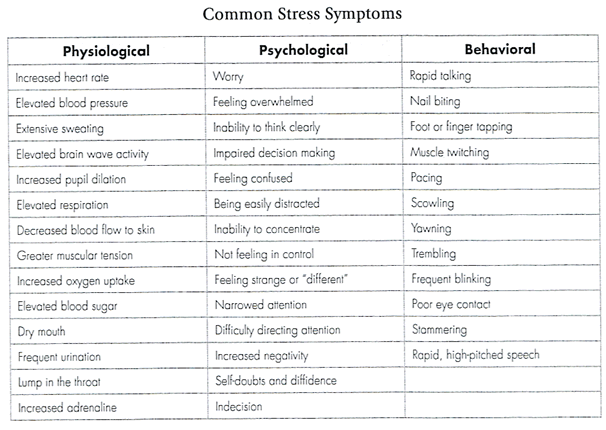|
In this eighth article in the series on Psychological Skills
Training, Christine Lottes explains how to help athletes learn
that their belief about a stressor determines whether uncertain
competitive situations are viewed positively as a challenge,
or negatively as a threat. Athletes will learn to identify
what they can control in each situation, and what they cannot
control, and the impact this distinction has on their stress
levels and performance.
As with the previous articles, Christine provides readers
with downloadable information for coaches and a handout for
athletes. If you coach and have ever considered introducing
psychological skills training to your athletes, this article
and the previous ones written by Christine are highly recommended.
 Psychological
Skills Training: Stress Management Skills Psychological
Skills Training: Stress Management Skills
written by Dr.
Christine Lottes
Psychological Skills
Training series: previous issues
- Training
Your Athletes to be Mentally Tough
- Mental
Training Tools
- Goal
Setting and Self-Confidence
- Imagery
- Relaxation
and Energization
- Self-Talk
Skills
- Energy
Management
Athletes' negative stress levels can severely impact their
performances. Continuing our Psychological Skills Training
series in pelinks4u, this month's article provides
a script for the coach, and, 2 reproducible handouts (one
a script for the coach plus a handout for athletes) as we
look at how athletes can successfully manage their responses
to stressors.
Coach's Script for: Stress Management Skills
Bring to practice: coach's script; a copy of the athlete's
handout for each athlete (follows the coach's script); pencils
or pens; chalk.
Stress Management
Review:
- Physical and mental energy that fuels your athletic performance
is called your arousal level.
- It is important how your mind
interprets what is going on around you.
- Athletes have different optimal
energy zones.
- If you are not in your zone you
can do rapid relaxation to lower arousal,
or do energization to increase arousal.
Today: Stress
Management
- Athletes have to deal with stress if they're going to
reach their potential and achieve their competitive goals.
- The problem with stress is that
it can get in the way of playing well, it can destroy self-confidence,
it can cause conflict and hurt teamwork.
- Why do we feel stress?
- Stress is an imbalance between
what we perceive is being demanded of us - Competitive
demand - and what we perceive our capabilities
are for meeting those demands - personal control
- especially in situations in which success is important.
- Think about a time in sport when
there was what you perceived as a "big game."
If you were confident that you were ready for it, you saw
the big game as a challenge. But if you didn't think you
had the resources to play this opponent then you saw the
big game as a threat and were stressed, and then may not
have played as well. You may not have coped as well with
this situation. (Tell a story specific to your sport.
Ex. assigning an athlete to defend against a top scorer.).
- What you believe
about the stress determines whether uncertain competitive
situations are viewed positively as a challenge, or negatively
as a threat.
- Remember our self-talk
session (link listed in list, #6, top of page)? When an
event happens to you, you have beliefs about the situation
- how you interpret what has happened.
This interpretation of the situation determines your emotions
and behavior to a much greater extent than does the situation
itself.
- Example: The official misses a
call that is obvious to you. Depending on what you say to
yourself right then will determine how quickly you become
an effective player in the game for the team. "She
should have called that." "We could lose the game
because of that." "He's favoring the other team."
- Self-talk is one of the mental
tools we've been learning that we can use as a coping strategy
to manage stress. The other tools are imagery
and relaxation.
| List
two competitive sport situations that have caused you
to become stressed. These situations can be from any competition
(off-season, last season, etc.). |
Write
which is the least stressful which is the most
stressful |
Not doing my running this summer so that when we
had our first competition my lungs felt like they
were going to explode, and my legs weighed a ton and
I couldn’t last.
|
Least |
|
|
|
|
|
|
- Counter-arguments deal directly with negative,
unproductive, or irrational thoughts.
Take the least stressful situation
from the last exercise and complete the following:
| Negative
Thought that contributed to my stress... |
Counterarguments
for the negative thought. If you need to, see "Purposes
& Thoughts for Smart-Talk Scripts" (March Self-Talk
article). |
I'll never get in shape enough to play well and I've
let the team and coach and everyone down and they're
probably mad at me.
|
I'll concentrate on doing my best right now as I
can’t control what's past.
|
I will get in shape by working hard.
|
|
|
|
| |
|
|
|
| |
Coping Response:
- Inhale deeply while repeating a counterargument.
- Repeat the transition word "so"
and pause briefly.
- Repeat your physical relaxation
cue word (see relaxation
and energization article in December 2011 pelinks4u)
as you exhale deliberately.
Example: "I'll concentrate on doing my best right now
as I can't control what's past, so, relax."
Cue Words:
- Can also be used to quiet mind of intruding thoughts.
Ex. the word "ball" can be repeated or the word
"focus" is useful in many situations.
Summary
- Whenever possible work to reduce or eliminate sources
of stress that you can control: get enough sleep, healthy
nutrition, hydrate sufficiently and manage your time effectively
(set goals, prioritize what to do first, eliminate time
wasters).
- If the stressor can't be changed,
or you lack the capability to meet competitive demands,
modify how you view the situation in order to manage your
emotions.
- What you believe about the stress
determines whether uncertain competitive situations are
viewed positively as a challenge or negatively as a threat.
- View stress as a surmountable
challenge.
- Self-talk (counterarguments),
imagery, and relaxation (deep breathing and cue words) can
be used to manage stress.
- Focus on what you can control:
your thoughts and your actions.
- During the season we will be
continuing to work out mentally as part of our practices
and games.

Table 11.3 pg. 180 Sport Psychology for Coaches
(2008) by Drs. Damon Burton and Thomas Raedeke, Human Kinetics,
Champaign, IL.
Upcoming February and June/July (2013) articles on
Mental Training
In the February and June/July editions of pelinks4u
we will be looking at some practice-ready drills coaches can
use with their athletes in order to train them in the Psychological
Skills presented by Christine over the past year.
Download
Coach's Handout Here!
Download
Athlete's Handout Here!
(back
to pelinks4u homepage) |




 Psychological
Skills Training: Stress Management Skills
Psychological
Skills Training: Stress Management Skills